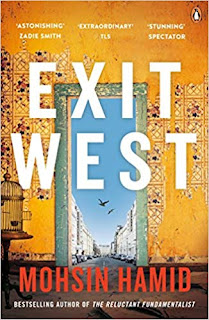"We are all migrants through time"
Exit West is a story about the migrant experience, specifically that of the large scale displacement played out on TV news as countless families flee from countries such as Syria for a better life in Europe. But Mohsin Hamid does something remarkable in this novel which sets out to tell an intimate version of the story through speculative fiction rather than news reel.
Everything about Exit West challenges perceptions of the migrant narrative in the media. In Hamid's tale the couple at the centre of the story, Nadia and Saeed, meet at an evening class about 'corporate identity and product branding'. Nadia is an accountant and Saeed works for an ad agency. They smoke pot and listen to music as the city around them starts to rumble with violence and rebellion.
Their decision to flee comes from the fear of what's to come and when the opportunity of a 'door' to the west is opened to them they grab it with both hands. Initially they arrive in Mykonos, as a stepping stone to mainland Europe, and ultimately London. Nadia and Saeed pass from country to country as if by magic.
The trauma of the journey itself is retained in the imagination with space on the page devoted to the experience of being displaced amongst an, at time, hostile community. The tension between 'native' and 'migrant' is played out brilliantly.
At times Hamid includes vignettes of other characters across the globe dealing with their own specific dilemmas. These parallel encounters serve to support the assertion that 'we are all migrants through time'.
Exit West is profoundly memorable, exquisitely written and truly provocative. 5
Everything about Exit West challenges perceptions of the migrant narrative in the media. In Hamid's tale the couple at the centre of the story, Nadia and Saeed, meet at an evening class about 'corporate identity and product branding'. Nadia is an accountant and Saeed works for an ad agency. They smoke pot and listen to music as the city around them starts to rumble with violence and rebellion.
Their decision to flee comes from the fear of what's to come and when the opportunity of a 'door' to the west is opened to them they grab it with both hands. Initially they arrive in Mykonos, as a stepping stone to mainland Europe, and ultimately London. Nadia and Saeed pass from country to country as if by magic.
The trauma of the journey itself is retained in the imagination with space on the page devoted to the experience of being displaced amongst an, at time, hostile community. The tension between 'native' and 'migrant' is played out brilliantly.
At times Hamid includes vignettes of other characters across the globe dealing with their own specific dilemmas. These parallel encounters serve to support the assertion that 'we are all migrants through time'.
Exit West is profoundly memorable, exquisitely written and truly provocative. 5

Exit West by Mohsin Hamid published by Penguin 240 pages









